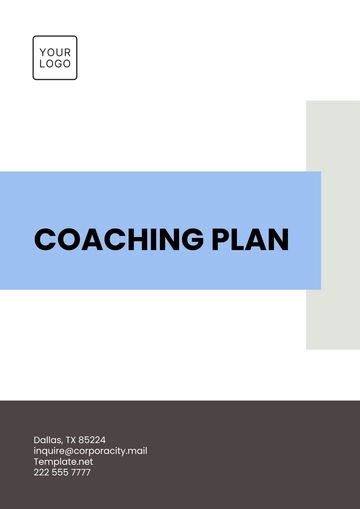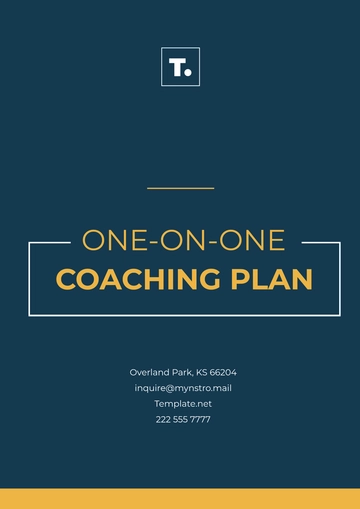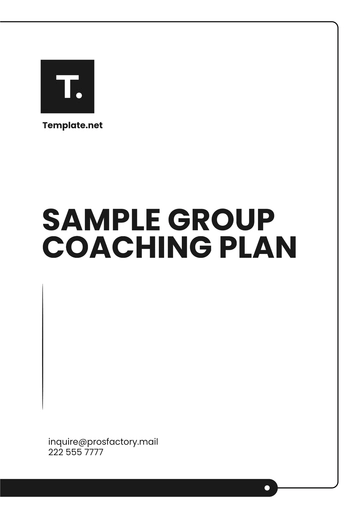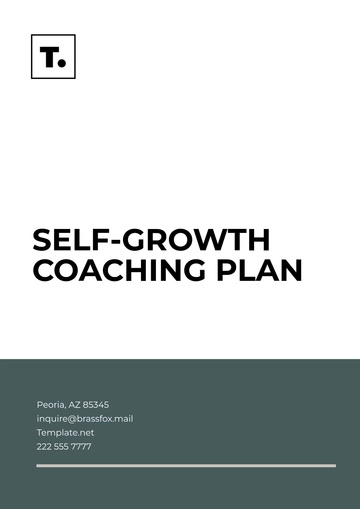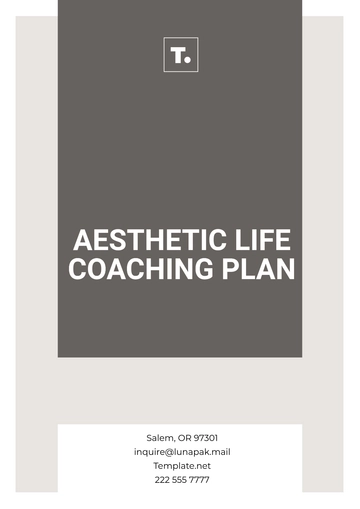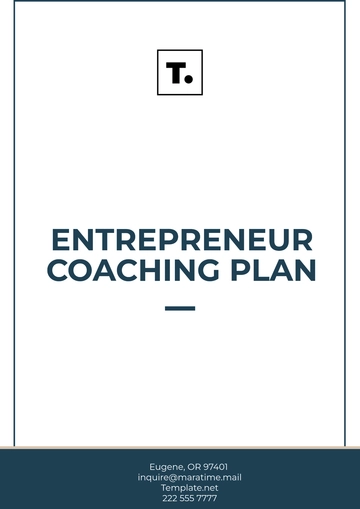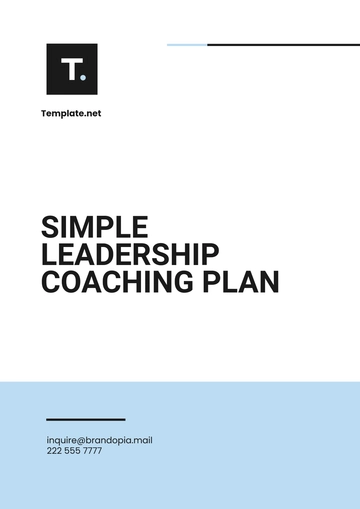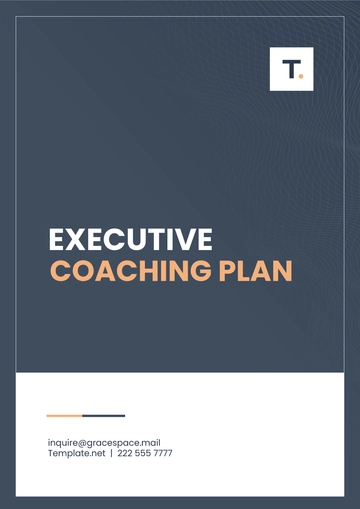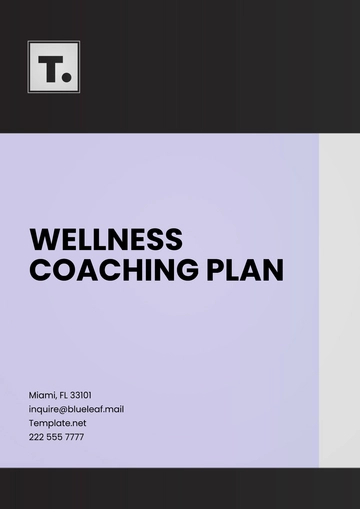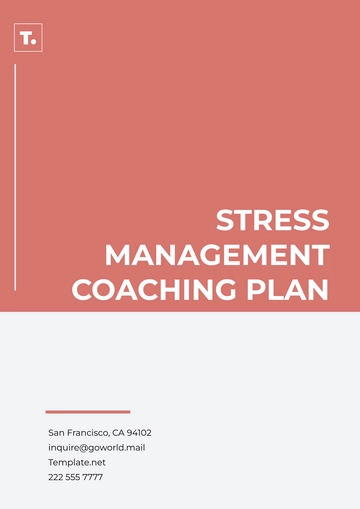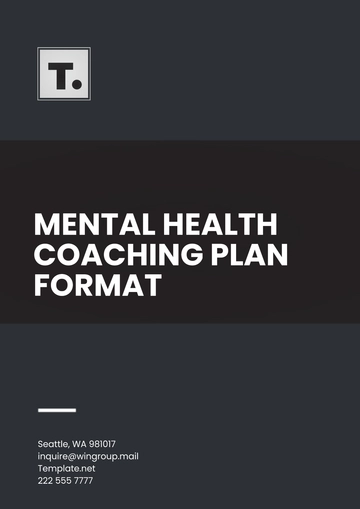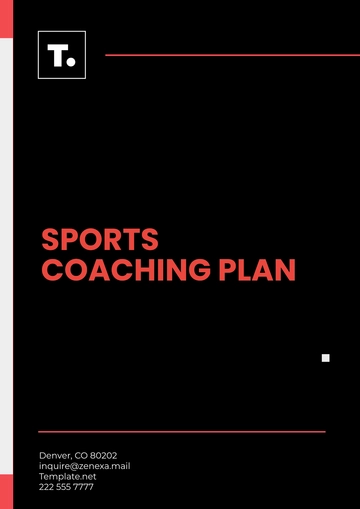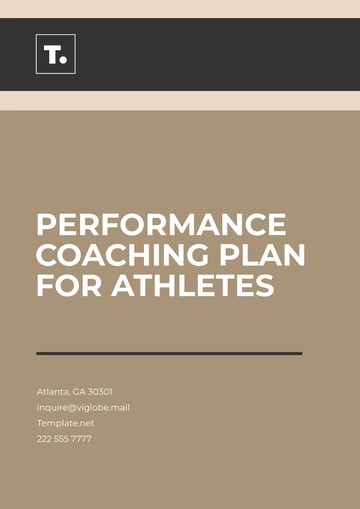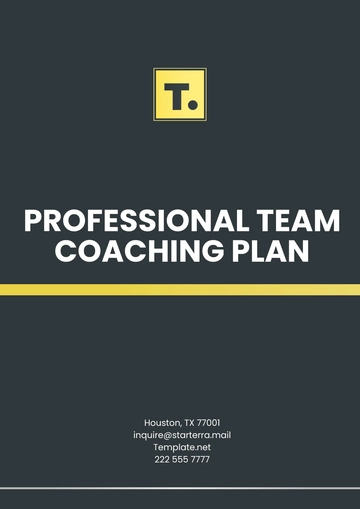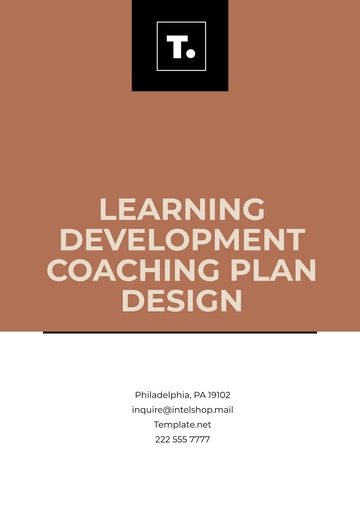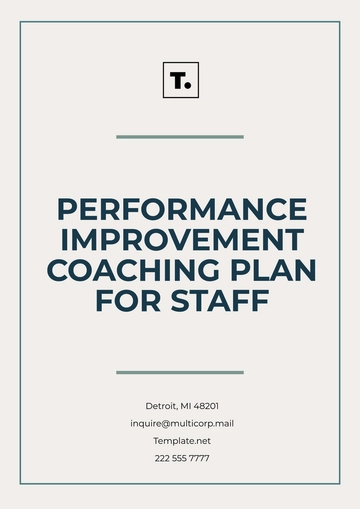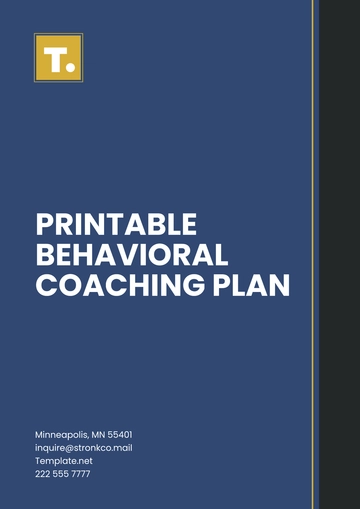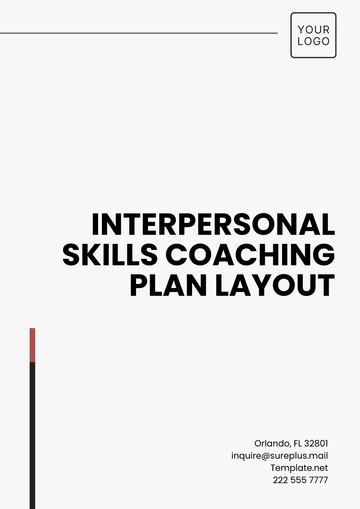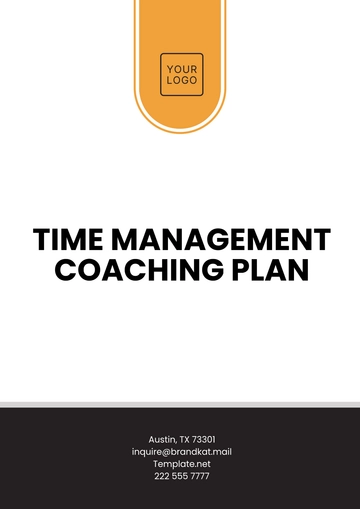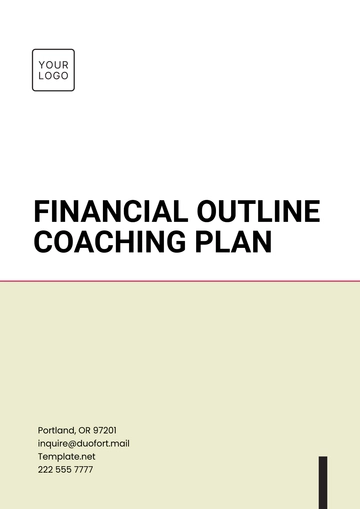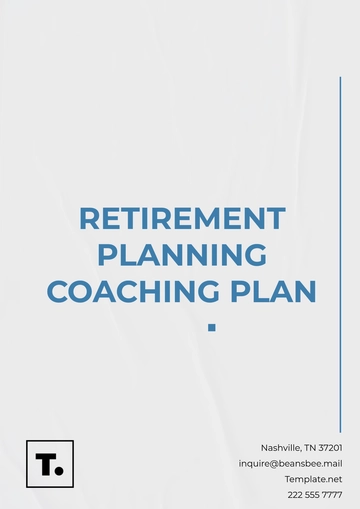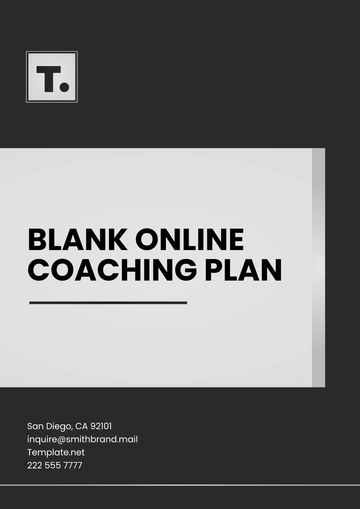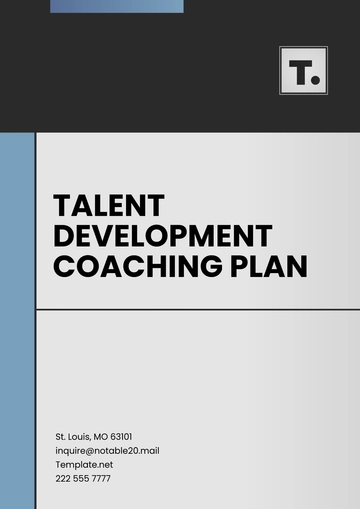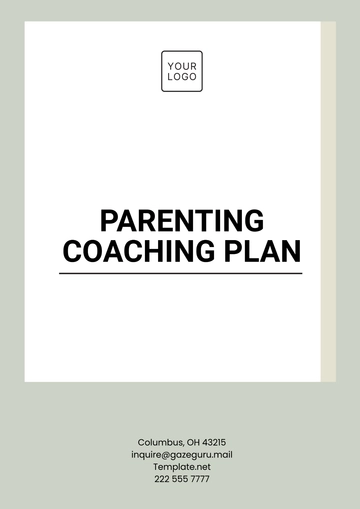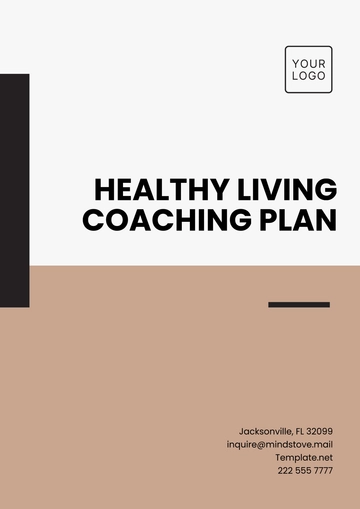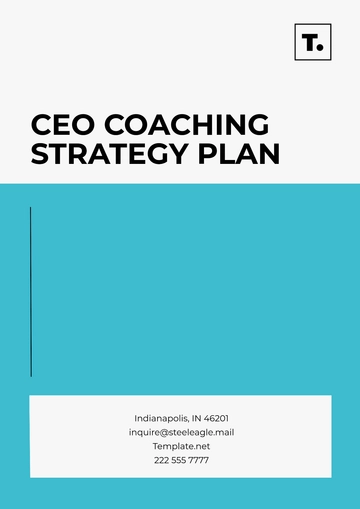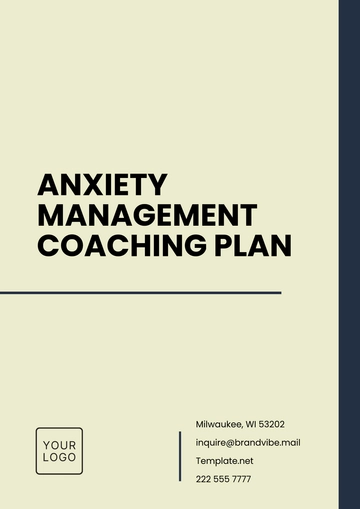Free Healthy Living Coaching Plan
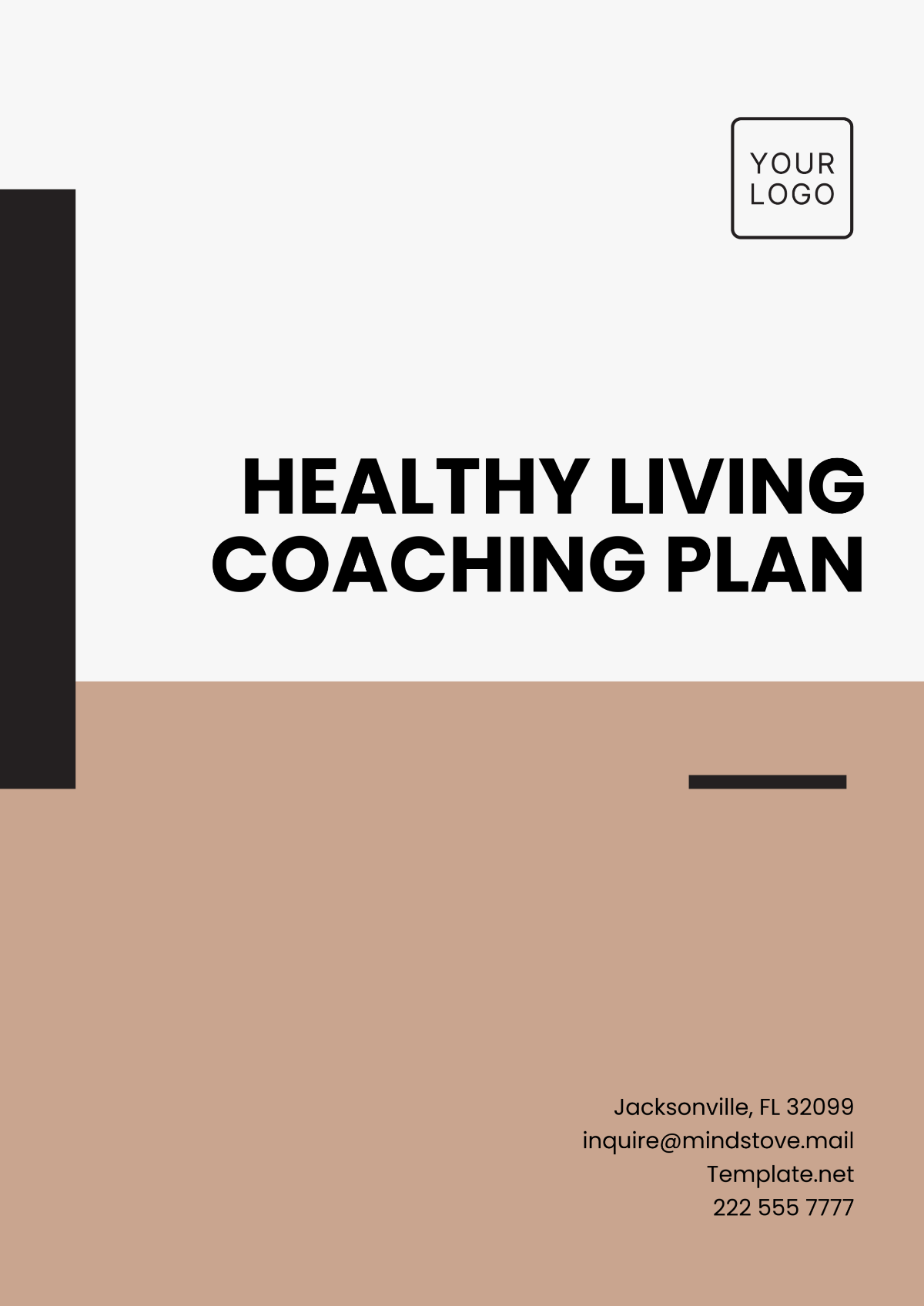
Prepared by: [Your Name]
Date: [Date]
I. Goals and Objectives
The goal of this Healthy Living Coaching Plan is to promote holistic wellness, addressing physical fitness, nutrition, and mental health. This plan focuses on achieving sustainable and realistic lifestyle changes that support long-term health improvements. The specific objectives include:
A. Weight Management
Achieve a gradual weight loss of 1-2 pounds per week over the next 6 months. This will be accomplished by incorporating balanced nutrition and a consistent exercise routine, focusing on sustainable habits rather than quick fixes. Weight loss will be tracked with monthly progress assessments, adjusting goals if necessary.
B. Improved Physical Fitness
Increase cardiovascular endurance, strength, and flexibility through a comprehensive exercise program. The focus will be on building strength and stamina to support daily activities, reduce injury risks, and enhance overall physical well-being. The goal is to improve fitness levels to the point where the individual can comfortably perform moderate-intensity activities, such as jogging or cycling, for 30-45 minutes.
C. Enhanced Mental Well-Being
Reduce stress and improve mental health by incorporating mindfulness techniques and relaxation strategies. Mental well-being will be prioritized to help manage daily pressures, improve focus, and ensure emotional stability. The target is to practice mindfulness for at least 10 minutes daily, aiming to reduce stress levels and improve sleep quality.
II. Assessment
A comprehensive assessment of current health, lifestyle, and habits will be conducted to tailor the coaching plan to the individual's needs. This will involve a detailed analysis of physical, nutritional, and mental health to identify strengths, weaknesses, and areas of improvement.
A. Current Health Status
An evaluation of the individual’s weight, body composition (body fat percentage, muscle mass), and overall physical fitness will be completed. Any existing medical conditions, such as diabetes, hypertension, or heart disease, will be considered to create a safe and effective plan. A baseline physical exam may be recommended to track changes over time.
B. Current Nutrition Habits
A thorough review of the individual’s current eating habits will be conducted by tracking daily food intake and portion sizes. This will help to identify areas of improvement, such as excessive calorie consumption, nutrient deficiencies, or an imbalance in macronutrients (carbohydrates, proteins, fats). The goal is to create a balanced, sustainable nutrition plan that supports weight management and overall health.
C. Mental Health Assessment
Stress levels, emotional well-being, and sleep quality will be evaluated using self-reported surveys or questionnaires. This assessment will identify mental health concerns like anxiety, depression, or insomnia, and develop strategies to address these through relaxation techniques, mindfulness, and sleep hygiene practices.
III. Action Plan
The action plan outlines specific strategies and activities aimed at achieving the defined goals. Each area—exercise, nutrition, and mental health—will include detailed actions and recommendations to ensure progress toward the desired outcomes.
A. Exercise Routine
Frequency: Engage in moderate-intensity physical activity at least 4-5 days per week. The routine will include aerobic exercises, strength training, and flexibility exercises to ensure a balanced approach.
Aerobic Exercise: Activities like brisk walking, jogging, cycling, or swimming for 30-45 minutes per session. Aim for at least 150 minutes of moderate aerobic activity per week.
Strength Training: Include bodyweight exercises, weight lifting, or resistance band training 2-3 times per week to build muscle and improve metabolism.
Flexibility and Mobility: Incorporate yoga, Pilates, or stretching routines 2-3 times per week to improve flexibility, prevent injury, and support joint health.
Progressive Challenge: Gradually increase the intensity, duration, or weight of exercises as fitness improves.
B. Nutrition Plan
Meal Structure: Follow a balanced meal plan with 3 main meals and 2-3 small snacks per day. Each meal should contain lean protein, healthy fats, fiber-rich vegetables, and whole grains.
Nutrient-Dense Foods: Focus on incorporating whole, minimally processed foods such as leafy greens, fruits, nuts, seeds, and lean protein sources like chicken, fish, and legumes.
Portion Control: Use portion control techniques, such as measuring serving sizes and mindful eating practices, to avoid overeating. Focus on eating slowly and recognizing hunger and fullness cues.
Macronutrient Balance: Aim for a balanced macronutrient intake of approximately 40% carbohydrates, 30% protein, and 30% fats, adjusting based on the individual’s goals (e.g., weight loss, muscle gain).
Hydration: Aim to drink at least 8-10 cups of water per day. Reduce consumption of sugary drinks and alcohol, which can hinder weight management and energy levels.
C. Mental Health and Well-Being
Mindfulness and Meditation: Practice mindfulness meditation for 10-15 minutes each day. Use guided meditation apps or techniques to develop focus, reduce anxiety, and enhance emotional resilience.
Stress Management: Integrate stress-relief activities, such as deep breathing exercises, progressive muscle relaxation, or hobbies, into the daily routine.
Sleep Hygiene: Establish a consistent sleep schedule by going to bed and waking up at the same time each day. Create a relaxing pre-sleep routine that includes activities like reading, journaling, or taking a warm bath. Avoid electronic screens 1 hour before bed to improve sleep quality.
IV. Timeline
The timeline provides a structure for achieving the set goals, with specific short-term and long-term milestones to track progress and ensure continued success.
A. Short-Term Goals (1-3 Months)
Weight Loss: Achieve a weight loss of 5-10 pounds by focusing on nutrition adjustments and exercise.
Exercise Routine: Begin with 3-4 days of exercise per week, gradually increasing to 4-5 days as fitness improves.
Mindfulness Practice: Implement daily mindfulness practice for at least 10 minutes per session.
Mental Health: Begin practicing relaxation techniques such as deep breathing or guided meditation 2-3 times per week to reduce stress.
B. Long-Term Goals (6 Months)
Sustainable Weight Loss: Achieve a healthy weight range, targeting a weight loss of 20-30 pounds over the course of 6 months.
Fitness Goals: Progress to a higher fitness level, including being able to complete 45 minutes of aerobic exercise and increase strength training intensity.
Mental Health Maintenance: Maintain stress levels within a manageable range and improve sleep quality, tracking improvements through regular mental health check-ins.
Lifestyle Integration: Fully integrate healthy habits into daily life, ensuring that exercise, balanced eating, and mental wellness practices become consistent and sustainable.
V. Support and Resources
Support systems and resources are essential for maintaining motivation and achieving success. This section includes tools and external resources that will assist with tracking, guidance, and encouragement throughout the process.
A. Tracking Tools
Fitness App: Use apps like MyFitnessPal, Fitbit, or Apple Health to log workouts, meals, and hydration.
Sleep Tracker: Apps such as Sleep Cycle or WHOOP can help monitor sleep patterns and provide insights on improving rest quality.
Food Journal: Keep a daily food journal or use a food-tracking app to better understand eating habits and monitor nutritional intake.
B. Support Systems
Weekly Check-Ins: Regular sessions with a certified health coach to assess progress, provide guidance, and adjust the plan as needed.
Group Support: Join a fitness community, online support group, or local wellness class for ongoing motivation, accountability, and camaraderie.
Personal Accountability Buddy: Partner with a friend, family member, or coach who can provide encouragement and hold the individual accountable.
C. Educational Resources
Nutrition and Fitness Guides: Access educational materials on the latest trends in fitness, healthy eating, and wellness from reputable websites, books, or magazines.
Wellness Podcasts: Listen to podcasts that focus on mental health, nutrition, and fitness for ongoing learning and inspiration.
Workshops and Webinars: Participate in workshops or webinars led by health and wellness experts to deepen understanding and refine skills in healthy living.
VI. Monitoring and Feedback
Continuous monitoring and regular feedback ensure that the plan stays on track and evolves as needed to meet the individual’s needs.
A. Monthly Check-Ins
Progress Evaluation: Assess weight loss, physical fitness (strength and endurance), and mental health improvements each month.
Adjustments: Based on progress, make necessary adjustments to exercise intensity, nutrition plans, and stress management techniques.
B. Continuous Feedback
Self-Reports: Regularly track progress through fitness apps, food logs, and journals. Share experiences and challenges with the health coach during check-ins.
Plan Adjustments: Re-evaluate goals, timelines, and action steps at regular intervals to ensure the individual is consistently moving toward long-term health goals.
Celebrating Milestones: Acknowledge and celebrate successes along the way, whether it’s achieving a fitness milestone, losing weight, or feeling more relaxed and energized.
- 100% Customizable, free editor
- Access 1 Million+ Templates, photo’s & graphics
- Download or share as a template
- Click and replace photos, graphics, text, backgrounds
- Resize, crop, AI write & more
- Access advanced editor
Guide your clients toward a balanced lifestyle with the Healthy Living Coaching Plan Template from Template.net. This editable and customizable template is perfect for coaches focused on nutrition, fitness, and overall wellness. Easily personalize each section using our Ai Editor Tool, tailoring the plan to your client's specific health goals. Promote sustainable lifestyle changes with a clear and actionable coaching plan that supports long-term health.
You may also like
- Finance Plan
- Construction Plan
- Sales Plan
- Development Plan
- Career Plan
- Budget Plan
- HR Plan
- Education Plan
- Transition Plan
- Work Plan
- Training Plan
- Communication Plan
- Operation Plan
- Health And Safety Plan
- Strategy Plan
- Professional Development Plan
- Advertising Plan
- Risk Management Plan
- Restaurant Plan
- School Plan
- Nursing Home Patient Care Plan
- Nursing Care Plan
- Plan Event
- Startup Plan
- Social Media Plan
- Staffing Plan
- Annual Plan
- Content Plan
- Payment Plan
- Implementation Plan
- Hotel Plan
- Workout Plan
- Accounting Plan
- Campaign Plan
- Essay Plan
- 30 60 90 Day Plan
- Research Plan
- Recruitment Plan
- 90 Day Plan
- Quarterly Plan
- Emergency Plan
- 5 Year Plan
- Gym Plan
- Personal Plan
- IT and Software Plan
- Treatment Plan
- Real Estate Plan
- Law Firm Plan
- Healthcare Plan
- Improvement Plan
- Media Plan
- 5 Year Business Plan
- Learning Plan
- Marketing Campaign Plan
- Travel Agency Plan
- Cleaning Services Plan
- Interior Design Plan
- Performance Plan
- PR Plan
- Birth Plan
- Life Plan
- SEO Plan
- Disaster Recovery Plan
- Continuity Plan
- Launch Plan
- Legal Plan
- Behavior Plan
- Performance Improvement Plan
- Salon Plan
- Security Plan
- Security Management Plan
- Employee Development Plan
- Quality Plan
- Service Improvement Plan
- Growth Plan
- Incident Response Plan
- Basketball Plan
- Emergency Action Plan
- Product Launch Plan
- Spa Plan
- Employee Training Plan
- Data Analysis Plan
- Employee Action Plan
- Territory Plan
- Audit Plan
- Classroom Plan
- Activity Plan
- Parenting Plan
- Care Plan
- Project Execution Plan
- Exercise Plan
- Internship Plan
- Software Development Plan
- Continuous Improvement Plan
- Leave Plan
- 90 Day Sales Plan
- Advertising Agency Plan
- Employee Transition Plan
- Smart Action Plan
- Workplace Safety Plan
- Behavior Change Plan
- Contingency Plan
- Continuity of Operations Plan
- Health Plan
- Quality Control Plan
- Self Plan
- Sports Development Plan
- Change Management Plan
- Ecommerce Plan
- Personal Financial Plan
- Process Improvement Plan
- 30-60-90 Day Sales Plan
- Crisis Management Plan
- Engagement Plan
- Execution Plan
- Pandemic Plan
- Quality Assurance Plan
- Service Continuity Plan
- Agile Project Plan
- Fundraising Plan
- Job Transition Plan
- Asset Maintenance Plan
- Maintenance Plan
- Software Test Plan
- Staff Training and Development Plan
- 3 Year Plan
- Brand Activation Plan
- Release Plan
- Resource Plan
- Risk Mitigation Plan
- Teacher Plan
- 30 60 90 Day Plan for New Manager
- Food Safety Plan
- Food Truck Plan
- Hiring Plan
- Quality Management Plan
- Wellness Plan
- Behavior Intervention Plan
- Bonus Plan
- Investment Plan
- Maternity Leave Plan
- Pandemic Response Plan
- Succession Planning
- Coaching Plan
- Configuration Management Plan
- Remote Work Plan
- Self Care Plan
- Teaching Plan
- 100-Day Plan
- HACCP Plan
- Student Plan
- Sustainability Plan
- 30 60 90 Day Plan for Interview
- Access Plan
- Site Specific Safety Plan
